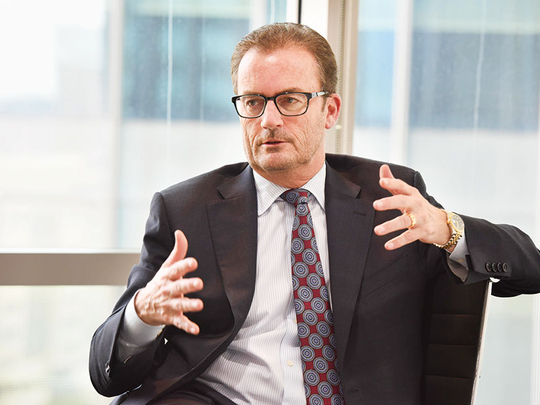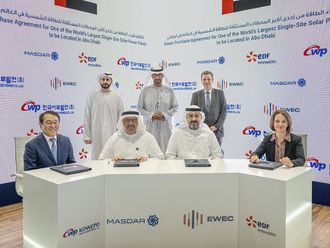
Dubai
The UAE and India are among the two most likely countries to be selected for the first commercially viable hyperloop transportation system, according to the chief executive of Virgin Hyperloop One.
Hyperloop is a futuristic mode of tube-based transport, resembling a train but travelling at the speed of a jet aircraft. The company says it will take a little over 12 minutes to reach Abu Dhabi from Dubai.
When pushed for tangible details regarding the link from Dubai to the capital, chief executive Rob Lloyd said that his company’s study on the benefits of hyperloop to the UAE’s economy had found that the transportation link could bring a one per cent increase in gross domestic product (GDP).
The CEO said that the studies also highlighted the economic windfall of increased competitive advantages, and a more effective deployment of the country’s workforce, due to the arrival of the high-speed system.
Despite such positive indicators, the company has yet to decide which country it will select for its first real system.
Lloyd did confirm, however, that India and the UAE were front-runners in the race. Offering a caveat, he said: “I can have a choice, and then we have to have a government that has to want to do it, too.”
Fresh from a trip to India, where the chief executive signed a framework agreement alongside Prime Minister Narendra Modi and Virgin founder Richard Branson, Lloyd said that the proposed route between Mumbai and Pune could bring $55 billion in economic benefits to the two cities over 30 years of operation.
In terms of the next steps to be taken to decide whether or not the UAE will be selected for the project, Lloyd said his company needed to determine the level of investment required for the Dubai to Abu Dhabi route.
“That’s the next phase,” he said, adding: “A deeper level of analysis than what we did for the preliminary phase that we’ve just completed. These are multibillion dollars projects, and we’re looking at innovative ways to finance these projects.”
On the issue of funding, Lloyd said that the company will “be raising money imminently.”
Considering the positive momentum the firm is currently experiencing, he said, they “will be discussing the opportunity to invest in the company.”
“Now is the optimal time to invest more money. Now is a good time to talk to investors around the world,” he added.
In January, the CEO stated that the goal for 2018 was to select the first one or two locations where projects were ready to move ahead.
“The economics that we saw on the preliminary screening [here in the UAE] were very favourable,” he said.
The senior executive added that one of his focuses moving forward would be to work with the UAE’s Roads and Transport Authority (RTA) to understand how a hyperloop system could link to the existing transport infrastructure, such as the Dubai Metro and the airports.
Meanwhile, Lloyd has hit back against critics who accuse the company and its competitors of being all style and no substance.
Responding to claims that the two major hyperloop companies often make grand statements but offer little in the way of concrete details, Lloyd said that Virgin Hyperloop One was “the only company that has built a full-scale hyperloop and shown that the technology works, the only company that has raised almost $300 million in funding, the only company that delivers world-class feasibility and economic impact studies to governments, versus other [companies] that sometimes say things and have a very hard time delivering.”
Lloyd added that the arrival of Virgin’s Richard Branson as the company’s chairman in December had added another layer of credibility to the organisation.
“A huge part of developing credibility is doing what you say you’re going to do.”
Hyperloop Transportation Technologies (HTT), a key competitor, said initially that it would build its first hyperloop by 2018. The company now says it is three years away from operation.
CEO denies reported acquisition attempt
Responding to a question about Virgin Hyperloop One’s reported rejection of a takeover attempt by Russian billionaire Ziyavudin Magomedov’s Caspian Venture Capital last December, Lloyd said: “That statement is not a correct statement … It has no basis in fact,” adding that there was no acquisition attempt.
Caspian Venture Capital, alongside DP World, did however end up reinvesting in the company in last December’s round of financing. The Dubai-based DP World is currently Virgin Hyperloop One’s largest investor, according to Lloyd.












